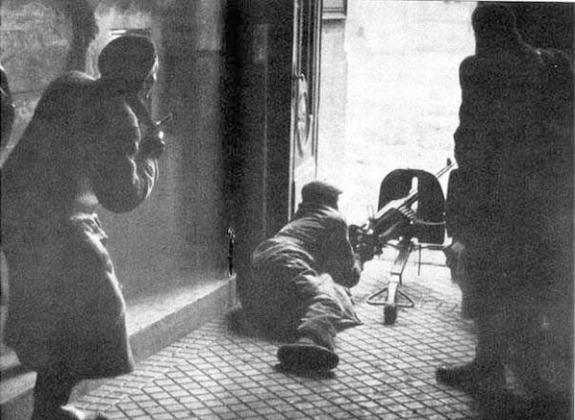
John Armitage: On Alain Joxe's Stuctured Chaos
 Joxe's depiction of the twentieth century, of a 'free world' and a 'communist world' with 'each obeying its laws, its images, its lies and its idols, and a 'Third World' which attempted to separate itself from the two others thanks to its size and despite its weakness' seems eminently sensible - on first reading. The problems, however, at least for me, begin with the idea that 'the tripartite world of bipolar nuclear stand-off seemed to disappear with the end of the Cold War' and that it was 'it was believed that the earth would finally become peaceful, or at least conform to the order outlined in the UN charter'. I suppose I wanted to know who it was that believed the Earth would finally become peaceful. Or orderly? Moreover, since when has the UN Charter been taken seriously, even by itself? This week, for instance, sees Hungary commemorating the 50th anniversary of its 1956 uprising against the Soviet Union, which ordered tanks into Budapest to crush it. Budapest's public buildings are still pockmarked by bullet holes. Yet where was the UN Charter or the UN itself when this national trauma was unfolding, when the Hungarian revolution was being brutally put down, and when, for two dramatic weeks Hungarians tried to resist their Soviet jailers? The Hungarians failed, of course, but they failed in large part because the UN stood by as the tragedy unfolded and the radio stations, the only means of communication, were shut down, one by one, by the Soviet Union, and at the cost of over 3,000 lives in the streets of Budapest. Nor was I clear how much courage the US and its allies needed to attack a weak Iraqi dictator after his invasion of Kuwait or, more recently, in the Iraq War. As I wrote in a recent article, 'The Elite War on Utopia':
Joxe's depiction of the twentieth century, of a 'free world' and a 'communist world' with 'each obeying its laws, its images, its lies and its idols, and a 'Third World' which attempted to separate itself from the two others thanks to its size and despite its weakness' seems eminently sensible - on first reading. The problems, however, at least for me, begin with the idea that 'the tripartite world of bipolar nuclear stand-off seemed to disappear with the end of the Cold War' and that it was 'it was believed that the earth would finally become peaceful, or at least conform to the order outlined in the UN charter'. I suppose I wanted to know who it was that believed the Earth would finally become peaceful. Or orderly? Moreover, since when has the UN Charter been taken seriously, even by itself? This week, for instance, sees Hungary commemorating the 50th anniversary of its 1956 uprising against the Soviet Union, which ordered tanks into Budapest to crush it. Budapest's public buildings are still pockmarked by bullet holes. Yet where was the UN Charter or the UN itself when this national trauma was unfolding, when the Hungarian revolution was being brutally put down, and when, for two dramatic weeks Hungarians tried to resist their Soviet jailers? The Hungarians failed, of course, but they failed in large part because the UN stood by as the tragedy unfolded and the radio stations, the only means of communication, were shut down, one by one, by the Soviet Union, and at the cost of over 3,000 lives in the streets of Budapest. Nor was I clear how much courage the US and its allies needed to attack a weak Iraqi dictator after his invasion of Kuwait or, more recently, in the Iraq War. As I wrote in a recent article, 'The Elite War on Utopia':"U.S. military casualties would indisputably have been larger and the move forward to Baghdad slower if the Iraqi armed forces had been in a serious position to wage a twenty-first century war. However, the Gulf War of 1991 and the post-1991 U.S./UK no-fly zone over northern and southern Iraq both added significantly to the disintegration and growing incompetence of the Iraqi military. Even before the Iraq war, Iraq's armed forces were ill disciplined, disordered, badly taught, and weak. Most of the Iraqi military's equipment was obsolete. It is hardly surprising that Iraq's military commanders made no determined preparations to protect Baghdad. In a nutshell, Iraq's armed forces were unable to adjust to a battleground wherein the U.S. military would move at near light speed with terrifying lethality before they could even decide to fire a shot. Saddam Hussein's 60,000 strong "elite" Republican Guard was confronted with the prospect of fighting a war against the American armed forces without maintained or up to date equipment, spare parts, or new information and communications technologies. Additionally, a large number of Republican Guard officers had been chosen for their allegiance to Saddam's regime rather than for their military expertise, or were on the brink of desertion"
Much of Joxe's commentary is then the commentary of 'military humanism', of the leading nations allying themselves against weak dictators from Saddam to Milosevic. Equally troubling, it seems to me is Joxe's notion that the 'World has by definition retained its shape' in the post-Cold War era. I remain unconvinced, since, for me at any rate, the world is currently losing its shape as hypermodern America's postindustrialized cyberwar shifts from derealization to geopolitical deterritorialization, to the virtualization of both its military and society. For whilst the American military increasingly bases itself on the supposed legitimacy of virtualization, of airpower, American society increasingly bases itself on the absence of any attachment to its own grounding, to its own physical territory. Here, then, we shift from the derealization of the combat zone, from its deterritorialization, to its aerialization or what Virilio (Virilio and Armitage, 2001a; 171) calls 'orbital space', a space that is currently the site of an extraordinary cybernetic, accelerated, strategic, and political revolution. Or, as I put it in a recent paper, 'Virilio Over Hypermodern America: Notes on the Art of War',
'We can say, therefore, that the increasingly delirium-inducing merger of military-strategic thought with the aerialized new media of destruction and action involving, for example, automated cruise missile air strikes against Sudan, Afghanistan, Iraq, and Kosovo, amounts to a new, hypermodern, understanding of America's founding principles. For what we are witnessing here is the emergence of hypermodern American _astropolitics_, of a geopolitics that dwarfs that of Hardt and Negri's (2000) _Empire_, of the globe, since it is centred on the _stars_, on the stars and stripes in outer space.'
Thus, for me, whilst the UN 'must bow before the whims of its leader', what Joxe does not seem to realize is that the leader has already left for the stars. To some extent, then, it is a question of coming to terms with the fact that the US no longer exists as a physical terrain, yet is determined to shape outer space in its own image. This too is a space united by certain principles. However, I suspect, there is a kind of structure to this disorder, to this manufactured astral chaos. Granted, it is no orderly French garden but a disorderly battlefield. In addition, this is a project that is taking shape right now, above our heads, but also within the US, which certainly assumes that the space of the earth is already its own, to do with what it will. But, of course, what is often left out of this sort of debate is the developments that are taking place within the US. So, whilst the US military assumes geopolitical responsibility for the planet on the one hand, of much more interest to me is not so much Southern Command, here:
http://www.southcom.mil/home/default.htm
But Northern Command or Northcom, here:
http://www.northcom.mil/
As I put it in 'The Elite War on Utopia':
'Northcom acts to undermine the Posse Comitatus Act. This process has been in train since at least the 1980s in America when internal duties were allocated to the armed forces as part of the disastrous "War on Drugs." Now some want the Department of Defense (DoD) to be handed responsibility for supervising U.S. border crossings and defending the outskirts of strategic cities over and above being drawn into the "War on Terrorism." However, departing from the custom of keeping the military out of police work is dangerous for democracy. Nor does such a policy make much sense as the military could only perform a useful anti-terror role if Al Queda was going to roll up for open combat, which seems unlikely. And so, like UAV's, Northcom is in the business of accustoming citizens to everyday war, to witnessing bands of soldiers on the streets and to life in the post-democratic stratocracy that is present day America. Out of sight, Northcom has hundreds of individuals gathering domestic intelligence and receiving information from the police and the intelligence agencies. The justification for the second Cold War, like the first, when army intelligence units surveilled U.S. civilians, is naturally the communist/Islamist/terrorist (delete as appropriate) "threat." Accordingly, U.S. citizens must adapt to technologically advanced surveillance aircraft patrolling over their cities hunting terrorists. None of these events are liable to agonize the U.S. military. The unswerving DoD viewpoint on everyday war has been that the U.S. President has enough legal authority to make use of the military when he decides that doing so is apposite (Dreyfus 2003: 3). At present, there are practically no circumstances in the U.S. where its armed forces are constrained by the Posse Comitatus, given that the U.S. military already supplies ultra-modern surveillance apparatus and helicopters to the police for suppressing demonstrations. The blurring of the boundary between civilian and military power is already underway as Northcom starts to think through its interactions with the CIA and the FBI whilst significantly expanding the role of the U.S. military at home.'
> John Armitage

